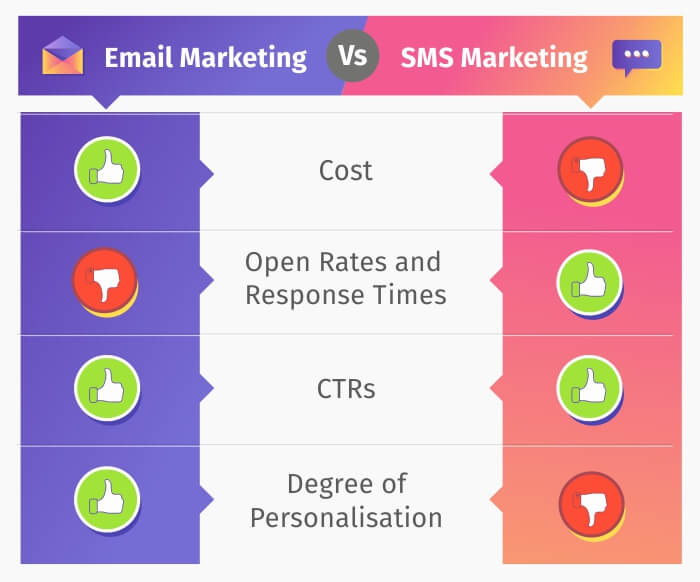24X7 online users. Non-linear customer journeys. Large quantities of user data. Increasing number of marketing channels. Evolving user expectations.
When is the right time to engage with your users? Which is the best channel to drive maximum engagement? What is the right frequency to send your marketing campaigns? What is the right kind of content that strikes a chord with the users?
User engagement is no cakewalk, is it?
But as the challenges are on the rise, so are the advancements in the world of marketing technology.
In this post, we’ll help you answer one of the many questions that poses a perpetual challenge for marketers like you.
Email or SMS – what channel of engagement should you use to address which specific use cases?
Both email and SMS have been traditional and powerful marketing channels across industries and brands.
But, what makes these individual channels tick?
What are the Advantages of Using Email as a Marketing Channel?
- Cost Effective: One of the greatest advantages of email marketing is the high ROI that it offers. Email marketing brings in $40 for every $1 spend. Isn’t that incredible?!
- High Degree of Personalisation: Starting from an optimised and personalised subject line to including attractive images and CTAs in the body, emails offer a lot of creative opportunities to craft interesting and engaging campaigns.Google’s recently released AMP-based dynamic emails in Gmail, now makes email on Gmail even more interactive and actionable. Such advancements in email marketing technology only reiterate that fact that email will remain a powerful marketing tool.
- Elaborate Content Sharing: Most channels, including SMS, have the ability to share limited amounts of content. Be it push notifications or in-app messages, you can only share short-form content restricted to fewer characters. Email has the power to deliver way more content. You can pack in a lot more information in a single email.
- Strengthen Customer Relationships: Email is a great channel for staying connected to existing customers and engaging with them consistently. Sharing good quality content strengthens customer relationships.Long-form content like reports, newsletters, blogs, crucial and confidential updates, etc. are best served through emails. No other channel can replace this function of email.
- Data-Driven Campaign Improvements: Performance measurement is indispensable for determining the success of any campaign. Email marketing, as a channel, provides extremely detailed and valuable performance metrics including delivery rates, open rates, click-through rates (CTRs), and subscriber retention rates.This data provides insights into your users’ evolving behaviours and interests. You can calibrate your marketing strategy towards based on these insights.
Why are the Advantages of Using SMS as a Marketing Channel?
- Wider Reach: Presently, over 35% of phone users in the world are best reached by SMS text messages. Almost 50% Indians still use a feature phone. This implies that SMS is the only marketing channel that enables you to reach user segments that aren’t connected to the internet.Whether a user has a smartphone or not, and whether he has data connectivity at the moment, doesn’t prevent the SMS from reaching him/her. In such a situation, the reach of the SMS is incomparable.
- Higher Delivery Reliability: All marketing channels, except SMS, depend on internet for deliverability. Since you can’t know if the user is connected to the internet, or is in a low-connectivity area, you can’t predict with certainty if the content has been delivered.However, SMS is free from such a dependency, and is more likely to get delivered it to their devices. This makes SMS a more reliable channel to communicate with your customers.
- Higher Open Rates: SMS receive an average open rate of 98%. This is higher than any other existing marketing channel.
- Instant Readability:Almost 90% of SMS are read within 3 minutes of delivery. Also, even if the users don’t open the SMS, that doesn’t imply they haven’t read it. Most phones today offer a preview, in the form of a snippet. So, your message still reaches your target audience.
- Ability to Stand Out: To get the attention of users who may find themselves overwhelmed with mobile push notifications, breaking past the clutter to reach your target audience is a critical challenge. SMS marketing, despite its effectiveness, remains largely underused. Research shows that only 21% of brands leverage SMS to communicate with their customers. Therefore, SMS as a channel presents a huge opportunity you can take advantage of.
What are the Differences Between Email and SMS Marketing?
Now that we’ve seen the various advantages that both email and SMS offer marketers, let’s take a closer comparative look at these marketing channels.
Both, email and SMS marketing have unique roles to play in your overall marketing strategy. Each has its benefits in the way they deliver information to your current and future audiences.
While both have distinct strengths, they can be evaluated on certain key metrics that drive the whole marketing exercise.
The comparison only suggests the exclusivity of the channels, not the merit of one over another.
After all, how wise is it to compare apples to oranges?

- CostWhile the cost of SMS marketing varies from region to region, length of the message, and the volume of messages sent, it is still way more expensive when compared to email marketing.Of all marketing channels, email marketing is the most cost-effective way to send non-time sensitive messages to a large user base. As mentioned earlier, every $1 spent on email marketing produces a $40 ROI.
- Open Rates and Response TimesAs a marketer, your eternal challenge is to grab the attention of your users. SMS marketing has their attention. The average open rate for text message marketing campaigns is 98% compared to a 20% average open rate for an email marketing campaign.Also, the average time taken by a user to read or respond an SMS is 90 seconds compared to 90 minutes for an email. So, when it comes to your open rates and response times, SMS definitely has an edge over emails.
- CTRsWhile email as well as SMS have high CTR potential, this metric is highly dependent on your Call-to-Action. Crafting a compelling CTA in an SMS is more challenging than that for an email, since the length of an SMS is limited to 160 characters.Emails on the other hand offer a lot of flexibility in terms of customised subject lines and creative CTAs. So, it is up to you as a marketer, to extract optimal performance from the marketing channel of your choice.
- Degree of PersonalisationThe role of personalisation in the success of a marketing campaign is undisputed. SMS takes a backseat in this regard. Since SMS comprises textual content of limited length, there is hardly any scope of personalising the message.On the other hand, email lets you add attachments, hyperlinks, images, and videos. You can even customise the subject lines of the emails to attract maximum attention.When Should you Choose SMS as a Marketing Channel?We’ve seen that SMS text messaging is known to produce open rates as high as 98%. So, if you intend your message to be viewed (because it is crucial), go for SMS campaigns.When your campaign has a desired action step for your customers to take, for instance, confirm your appointment, take this survey, or check out this sale – use SMS.Since the number of characters in SMS is restricted to 160, your campaigns have the benefit of always being concise. Crisp and meaningful content is the way forward with SMS.SMS can also be leveraged to communicate the following:
- Product offers, sales, deals, and coupons
- Surveys
- Appointments/reminders
- Sharing information with customers who don’t want to visit the app or website
- Periodic updates to keep customers in the loop
- Personal alerts, e.g. notifications and account updates
- Quick access to important information
When Should you Choose Email as a Marketing Channel?
Email can address multiple marketing use cases. As a general rule of thumb, email campaigns are apt for content that is not very time sensitive. Also, when you have lots of content that you would like to send, email is better suited.
Here are some high-conversion campaigns for which emails work best:
- Newsletters
- Press updates
- Blog posts
- In-depth educational content
- Feedback, advice, or action requests
- Product or service promotions
Can Email and SMS be Used Together?
Definitely!
2 out of 3 users check their emails on their smartphone. This implies that if you haven’t been able to reach your customers through email, you can always engage with them through SMS.
While the two channels are uniquely efficient in their own right, a combination of both these marketing channels can be powerful.
They complement each other quite effectively in strengthening customer relationships by effectively harnessing marketing automation. It isn’t really wise to focus on one and neglect the other.
Here are major use cases that can be addressed through the combination of email and SMS can, as part of your overall marketing strategy:
- Personalise SMS Content: You can use your existing email user data to personalise the content of the SMS. For instance, you can modify the SMS content on the lines of email subject lines that work well with different user segments.
- Revive Lost Email Contacts: Users often change their email addresses and so, are likely to be lost. But, mobile numbers tend to remain unchanged for longer periods of time. Hence, SMS is a simpler way to maintain contact, and also to obtain new email details to keep your email database up to date.
- Send Timely Reminders: You can use SMS as a follow up to promotional emails, adding last minute discounts and deals to prompt your users to open your emails. In fact, by sending a follow-up SMS text to your customers asking if they’ve read your email, you can increase open rates by as much as 30%.
- Leverage Cross-Channel Campaign Insights: The data insights derived from email and SMS campaigns can be utilised to further improve your user engagement and retention metrics.For instance, the most active users that respond to your email campaigns can be targeted through SMS too, to further reinforce the relationship. Or, the ones who don’t respond to your SMS campaigns can be targeted through email instead.
- Building the user base: Existing SMS databases are an ideal source of contacts to build your email database, and vice versa. Both channels can ideally support each other in facilitating the expansion of your customer database.
Parting Thoughts
Email is evolving, and so is SMS. Both have their own pros and cons. As smart goal-driven marketers, the better you understand the applicability of these channels as independent marketing channels as well as integral parts of multi-channel marketing automation, the higher your marketing ROI.
Determine the right balance that suits your industry, calibrate, and recalibrate. Ultimately, it is not about email or SMS, it is about delivering the right message to the right user at the right time, through the right channel!
Also Read: How to Make Money through SMS Marketing
To understand more about Netcore Smartech’s marketing channels and automation platform, connect with us today!







